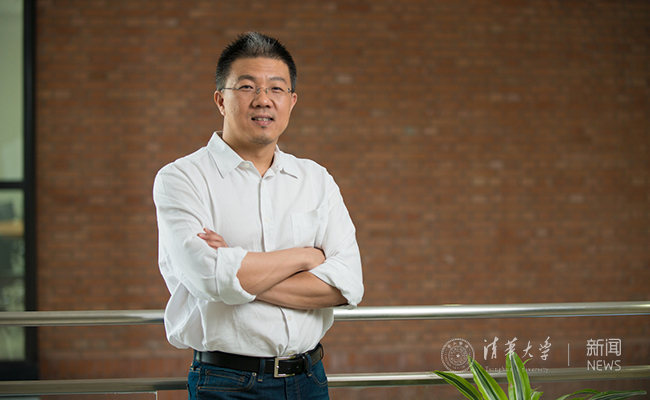Drs. HaiQi and WeiXie of Tsinghua University selected as International Research Scholars by the Howard Hughes Medical Institute
On May 9, 2017, the Howard Hughes Medical Institute (HHMI) officially announced recipients of its International Research Scholars award. Dr. Hai Qi from the School of Medicine and Dr. Wei Xie from the School of Life Sciences of the Tsinghua University are among a group of 41 scientists around the globe receiving this award.
HHMI was established in 1953 by the American industrialist and philanthropist Mr. Howard R. Hughes (the 2004 movie the Aviator was based on his legendary life). As the world’s largest biomedical science philanthropy, HHMI has as its mission to advance biomedical research and science education for the benefit of humanity. Its unique approach to pursue this mission is to fund “people, not projects”. HHMI invests in scientific thought leaders and emerging research pioneers, supporting their freedom to follow curiosity and instinct in scientific exploration and to apply creative approaches to tackle hard problems. In the US, HHMI-supported investigators include 25 Nobel laureates and 180 members of the National Academy of Sciences. The International Research Scholars Program has been established with the same “people, not projects” principle to select and support outstanding early-career scientists from around the world outside of the G7 countries. In the current open competition, HHMI has partnered with the Bill & Melinda Gates Foundation, the Wellcome Trust, and the Calouste Gulbenkian Foundation to commit $26.7 million in funds. A total of 41 scientists were selected from more than 1400 applicants through a two-tier competition process to each receive $650,000 for research support in the next 5 years.
Both Drs. Hai Qi and Wei Xie are excited about their selection as HHMI International Research Scholars. They consider this as a great honor to them and their respective research teams, and also an endorsement for the hard work that their groups have undertaken over the years. Reflecting on their past work and future directions, Dr. Xie said, “Our team has always been trying to tackle important but difficult problems. Once overcoming the difficulty, the freedom and joy to explore the unknowns is the best reward for our hard work.” Dr. Qi noted that great scientists open and push new frontiers in their fields, and this requires not to follow the latest trend in the news and take the beaten path in the book, but to follow one’s instinct, perhaps at times bold and unconventional, and dig deep with rigor, patience and perseverance.

Dr. Hai Qi obtained his Bachelor of Medicine from the Beijing Medical University in 1996, PhD in Experimental Pathology from the University of Texas Medical Branch at Galveston. He conducted postdoctoral research at US National Institutes of Health from 2003 to 2009. Dr. Qi joined the faculty of School of Medicine, Tsinghua University in 2009, and he was appointed to the Tsinghua-Peking Center for Life Sciences in 2011. He studies immune regulation of antibody responses and tries to understand how the immune system develop and maintain memory of invading pathogens so as to improve vaccines and strategies to treat autoimmune diseases. In this field, he has published 40 primary papers, including four in Nature and two in Science as first or corresponding authors. Dr. Qi is a Ministry of Education “Cheung Kong Scholar”, an NSFC “Distinguished Young Scholar”, the Chief Scientist for a “973” program, and “Young Talent in Science and Technology” of Ministry of Science & Technology. He has received numerous awards including the Tan Jiazhen Award for Life Sciences (2015), the CBIS Young Investigator Award (2016) and the Wu Jieping-Paul Janssen Medical &Pharmaceutical Award (2016).

Dr. Wei Xie received his B.S. degree in Biological Sciences at Peking University in China in 2003. He then went to UCLA and obtained a Ph.D degree in Molecular Biology and a M.S. double degree in statistics in 2008.After completing his postdoc training at the Ludwig Institute for Cancer Research, UCSD in 2009, he joined Tsinghua University, School of Life Sciences as a Principle Investigator in 2013. He is also a member of the Tsinghua-Peking Joint Center for Life Sciences. Using interdisciplinary approaches, Dr. Wei Xie is dedicated to understanding how the epigenome is inherited, reprogrammed, and established in early development when life just begins. By doing so, he wishes to decipher how highly specialized sperm and oocyte are converted to a totipotent embryo and how information is transmitted between generations during this process. These are among the most fundamental and challenging questions in developmental biology. Dr. Xie has authored over 30 publications, including several published in Nature, Science, Cell as the first-author or the correspondence author. As a result of his scientific excellence, Dr. Xie has won Thousand Young Scholar Program of China in 2013, Excellent Young Scholar Award from National Science Foundation of China in 2014, and Qiushi Excellent Young Scholar Award in 2014.

